2 Phonology
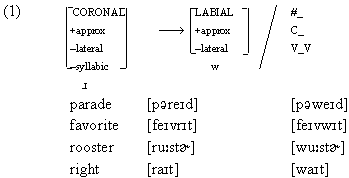
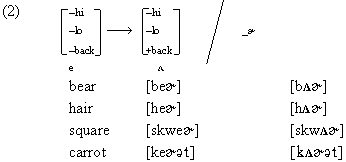
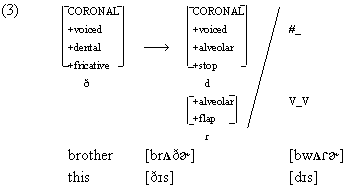
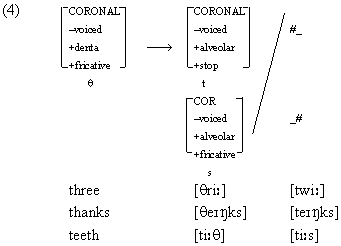
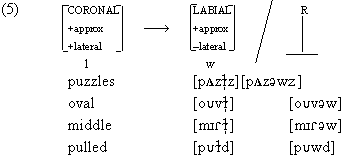
 ] draws the tongue farther back in the mouth; this is, therefore, a type of assimilation. This seems to be an idiosyncrasy in Evaís speech, since none of the other children (or her parents) pronounce these words this way. (3) and (4) detail two further very common substitutions: stops for fricatives. The voicing values remain the same for each. Also note that [s], which in English usually is the first fricative to appear, can also substitute for the more difficult [
] draws the tongue farther back in the mouth; this is, therefore, a type of assimilation. This seems to be an idiosyncrasy in Evaís speech, since none of the other children (or her parents) pronounce these words this way. (3) and (4) detail two further very common substitutions: stops for fricatives. The voicing values remain the same for each. Also note that [s], which in English usually is the first fricative to appear, can also substitute for the more difficult [ ]. Finally, (5) shows syllabic or dark [l] becomes a [w]. This is again a familiar substitution of a glide for a liquid, and is from a change both in the place of articulation and in the feature [
]. Finally, (5) shows syllabic or dark [l] becomes a [w]. This is again a familiar substitution of a glide for a liquid, and is from a change both in the place of articulation and in the feature [ lateral]. A syllabic [l], by virtue of its being syllabic, will appear in the Nucleus of a syllable, and dark [l] always appears in the Coda. Thus, any [l] in a syllableís rhyme will be dark, and will tend toward the [w] or even a [
lateral]. A syllabic [l], by virtue of its being syllabic, will appear in the Nucleus of a syllable, and dark [l] always appears in the Coda. Thus, any [l] in a syllableís rhyme will be dark, and will tend toward the [w] or even a [ ] in Evaís speech. Again, this is not unusual, as the tongue is drawn back, and is lowered.
] in Evaís speech. Again, this is not unusual, as the tongue is drawn back, and is lowered.
 , CCVC, and CVCC (6).
, CCVC, and CVCC (6).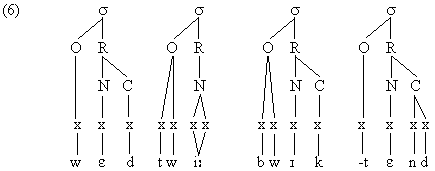
3 Morphology
|
(7)
(8) |
It tastes yucky.
I am. This is pizza. These are my orange shoes. Iím making a bear. Hereís a snake. Theyíre for your car. I like to go in the lizardís mouth. He needs corn... Hereís some corn for him. |
Heís got one
Weíre both driving. Iím painting a tree. Heís pinched me. I pulled his hand. I made a diamond. I saw one. snakes bears sausages |
 s] is simply difficult to say, or that her parents constantly remind her to brush her teeth, so that she has learned this form. However, I am forced to note that teeth was a spontaneous utterance, while all the irregular plurals listed came from an identification task at a different time. The nature of the elicitation could have affected the results.
s] is simply difficult to say, or that her parents constantly remind her to brush her teeth, so that she has learned this form. However, I am forced to note that teeth was a spontaneous utterance, while all the irregular plurals listed came from an identification task at a different time. The nature of the elicitation could have affected the results. | (9) |
foots
mouses |
fishes
sheeps |
octopuses
Mickey Mouses |
| (10) |
No, itís a oval.
Hereís a eye. Heís got a one of those. |
| (11) |
globe-ball
kitty-cat-s |
4 Syntax
| (12) (13) |
Why you were sitting on K.ís chair?
What are they doing with your crawfish? |
The only real difference between the two is the [+past] tense marking of be in the first sentence. One could argue that the cognitive load of two movements and a tense marker became too great a burden for Eva, who was then forced to sacrifice the inversion rule. I hesitate to argue for this analysis on the basis of a single sentence, so I shall at this point ascribe it to natural variation caused by constant internal modification of her grammar. This seems plausible, given her age is in the midst of the ďAll Hell Breaks LooseĒ stage of development.
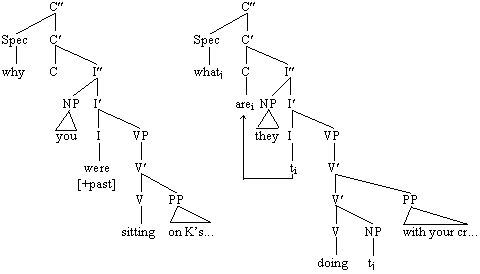
| (14) (15) (16) |
Why do you donít?
Why do you not? Why donít you? |
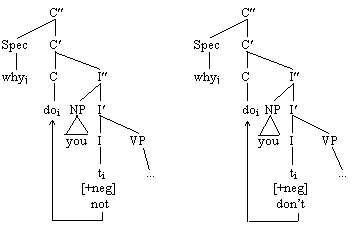
|
(17) (18) |
A: Donít you want to talk to the crawfish?
E: No I donít. A: Do you like mad worms? E: No. A: Do you not like mad worms? E: I said Ďnoí. |
| (19) | Why do you canít do X? |
| (20) | No, I no want the dark blue, I want the light blue. |
| (21) (22) |
E: You just turned me.
A: I didnít. You turned yourself. E: No, you turned yourself. I turned yourself. A: You turned myself? E: Yeah. This  is his shoes is his shoes . . |
4 Conclusions
Back
Language Acquisition